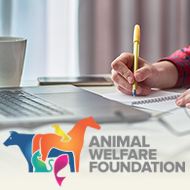AWF announces desk-based research grants

Five grants of up to £10,000 each are being made available for research proposals that focus on priority animal welfare issues.
New grants for desk-based research projects have been announced by the Animal Welfare Foundation (AWF) in a bid to support research at a time when social distancing measures have made fieldwork difficult.
Five grants of up to £10,000 each are being made available, with the flexibility of funding to be increased to £30,000 for one exceptional research proposal. The grants will support research projects that focus on priority animal welfare issues in the UK, as identified by a seminal 2019 Delphi study funded by AWF, and will be tenable for up to six months.
The AWF welcomes proposals on topics such as scoping exercises to assess delayed euthanasia in farm animals, dogs or cats, and the validity, reliability and impact of the quality of life assessment tools for companion animals. Other proposals might include:
- any of the other 11 overarching welfare issues identified by the AWF Delphi project, “Prioritisation of animal welfare issues in the UK using expert consensus
- the welfare issues identified by the British Veterinary Association (BVA) as issues of particular interest for the veterinary profession, and whose results could support the profession in tackling them
- any welfare issues that have become evident during the Covid-19 pandemic.
“Funding scientific research to find practical solutions to animal welfare issues has always been at the heart of AWF’s work, and we are committed to ensuring that it remains high on the agenda even during the ongoing pandemic,” said AWF Chair of Trustees Chris Laurence.
“Covid-19 has meant that we need to re-think our approach, as carrying out fieldwork whilst social distancing measures are in place is not feasible. That’s why we’ve decided to offer funding for short, desk-based research projects that can be safely carried out during this time.I’d encourage all researchers with an interest in animal welfare to apply for this generous grant.
Research results should be appropriate for publication in a peer-reviewed open-access journal. Successful applicants will also be invited to present their work to the veterinary and animal welfare communities at the annual AWF Discussion Forum and other key veterinary events.
Applications are open until 12 July 2020, for more information and details on how to apply, visit animalwelfarefoundation.org.uk



 The Veterinary Medicines Directorate (VMD) is inviting applications from veterinary students to attend a one-week extramural studies (EMS) placement in July 2026.
The Veterinary Medicines Directorate (VMD) is inviting applications from veterinary students to attend a one-week extramural studies (EMS) placement in July 2026.